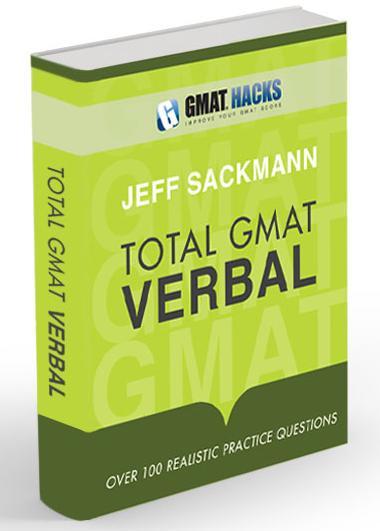
Bookshelf
|
|
Total GMAT Math Jeff's complete Quant guide, on sale now! |
|
|
Total GMAT Verbal Everything you need to ace GMAT Verbal! |
1,800 Practice Math Questions
Buy Jeff's books at Amazon.com

GMAT Official Guide, with IR
OG Math | OG Verbal
OG12 & Quant Rev solutions!
GMAT Question of the Day
Beginner's Guide to the GMAT
GMAT Hacks Affiliate Program

Recent Hacks

Categories
- General Study Tips
- Goals and Planning
- CAT Strategy
- The Mental Game
- GMAT Math Strategy
- GMAT Math Topics
- Mental Math
- Data Sufficiency
- Critical Reasoning
- Reading Comprehension
- Sentence Correction
- Analytical Writing Assessment
- Integrated Reasoning
- IR Explained
- Business School Admissions
- GMAT Prep Resources
- Practice Questions
- Total GMAT Math
- Total GMAT Verbal
- GMAT 111

Avoid Careless GMAT Mistakes
| You should follow me on Twitter. While you're at it, take a moment to subscribe to GMAT Hacks via RSS or Email. |
Everybody makes careless errors on the GMAT math section. That's life. All we can do is minimize how many we make. Luckily, there are several techniques you can use to accomplish that.
But first, it's important to distinguish between two types of "careless mistakes." Many students use that term when referring to the results of, say, misremembering the work formula. Or incorrectly setting up a rate problem.
In other words, "careless mistake" is used as a synonym for "I should've known better." That's partly true: you should've known better. But that's a problem you can only solve by learning the content better. True "careless errors" are a different story entirely.
I'm talking about adding 9 and 6 and getting 17, or turning a z into a 2, or cross-multiplying by multiplying the denominators by each other and the numerators by each other. Admit it: you've done all this and more, and it's tough to avoid those missteps entirely.
Fortunately, there's at least a partial solution.
Show Your Work!
In elementary school, I had teachers who insisted that I show every step of my work on math problems. I hated it. I rebelled against it. It was a waste of time.
Maybe you can usually do math perfectly without writing very much of it down. It's not a good idea, though.
There are two benefits to showing every step of your work. First, you have a record of your solution, so if you did make a mistake, you can backtrack easily and find it. Second, you clarify the way you think about the problem. Having to write down every step is the single most effective way to confirm that you really know what you're doing.
Perhaps you're objecting at this point: I know, I've heard it before. Showing your work supposedly takes longer, and you're already under a great deal of time pressure.
I don't buy it. Once you're in the habit of showing your work, the process will actually go faster. You'll spend less time re-reading questions and trying to juggle seven steps in your head. Instead, your pen will always be moving, and you'll make steady progress toward the answer.
An Experiment
Last weekend, I wanted to prove to myself that this was true: you have more than enough time to write down all your work and complete 37 questions in 75 minutes. To do so, I took one of the GMATprep practice tests, and forced myself to write down every word of every question.
In other words, I took "show your work" to an absurd extreme.
Granted, I'm pretty good at GMAT math (or else I'd wonder why you're reading this site), but whatever benefits I might have by virtue of my long experience with the test are doubtless cancelled out by having to write down every word of every question. (Along with every step of my solutions!)
The Results
It worked. Even writing down every last detail, I finished the math section in 70 minutes. (I even checked a couple of incoming emails in that time.) Not only that, I was able to limit all of that writing to the front and back of six sheets of paper. That was harder than the time management aspect.
But remember, I wrote down way more than you ever will. The point is simple: you have all the time you need, and all the space you need, to write down all of your work.
More About Those Careless Mistakes
When you write down all those steps, you'll be able to better isolate where you are making mistakes. Perhaps it's long division--in which case you should focus on incorporating some mental math tricks into your arsenal. Maybe it's just the last step, no matter what the content of it.
As I've emphasized on this site before, it's important to slow down when practicing, until you are confident in what you're doing. Just like a pianist who practices etudes slowly until she masters the piece at that tempo, you need to work at a speed that is comfortable for you. There's plenty of time to speed up later.
Most importantly, there's no value in speeding up before you're ready: like the pianist, accelerating too soon just means that the end result is going to be a mistake-ridden muddle. There's more than one way to get your target GMAT score, but a mistake-ridden muddle is never one of them.
About the author: Jeff Sackmann has written many GMAT preparation books, including the popular Total GMAT Math, Total GMAT Verbal, and GMAT 111. He has also created explanations for problems in The Official Guide, as well as 1,800 practice GMAT math questions.
 |
Total GMAT Verbal
The comprehensive guide to the GMAT Verbal section. Recognize, dissect, and master every question type
you'll face on the test. Everything you need, all in one place, including 100+ realistic practice questions. |